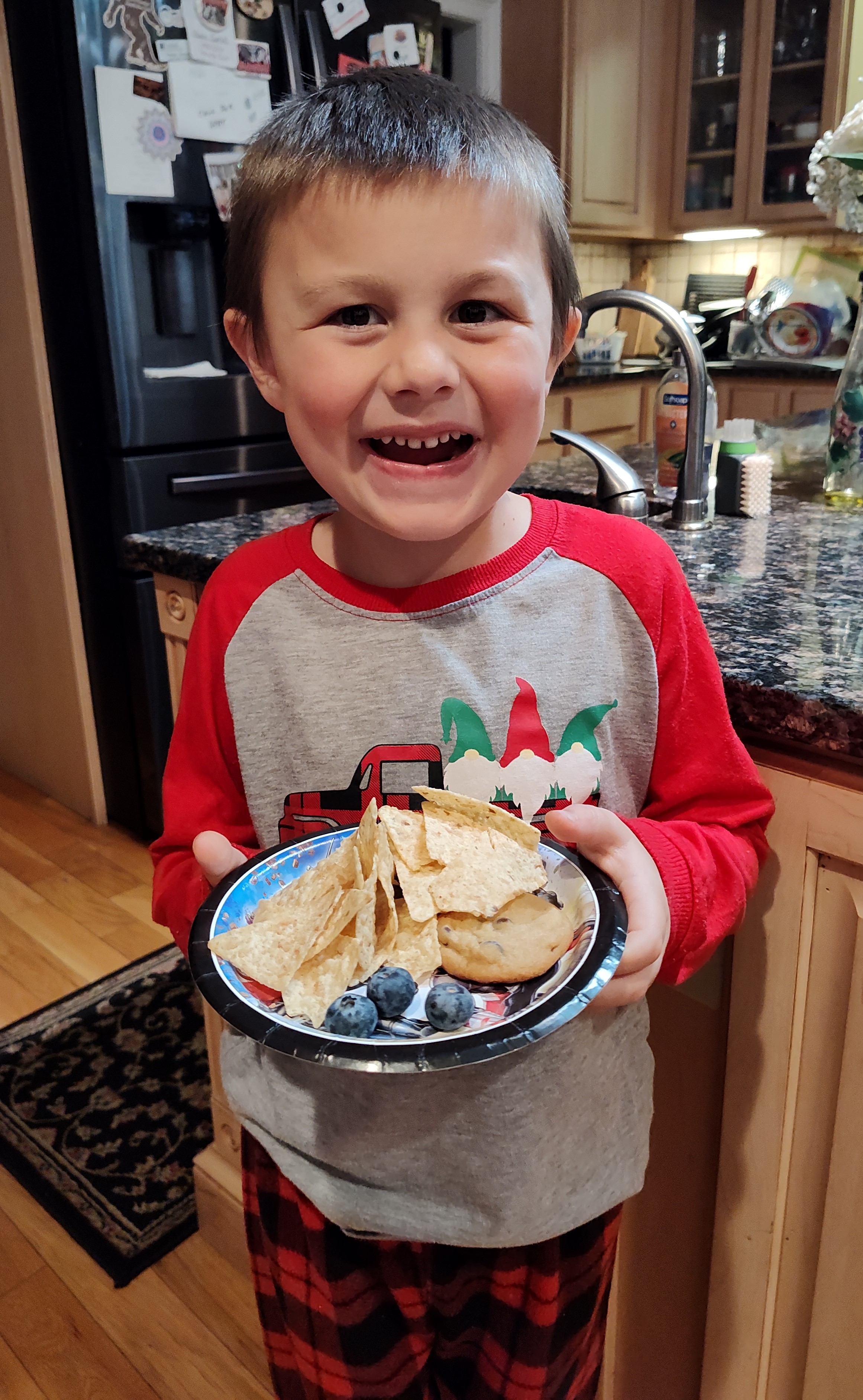What's On Your Plate?
 I often invite people to join a group at church or attend a retreat or event, and sometimes the response I get is – My plate is too full. I know that feeling. There have been many times in my life that my plate has been overflowing and I'm feeling a lot of stress. I want the world to stop for just a bit so I can get caught up. Unfortunately, I have never been able to make that happen, so I have to find another way to deal with the load.
I often invite people to join a group at church or attend a retreat or event, and sometimes the response I get is – My plate is too full. I know that feeling. There have been many times in my life that my plate has been overflowing and I'm feeling a lot of stress. I want the world to stop for just a bit so I can get caught up. Unfortunately, I have never been able to make that happen, so I have to find another way to deal with the load.
I took 6-year-old Noah to a birthday party recently and helped him fill his plate. He wanted chips, a couple of slices of apples, and a cupcake. That was it. I have a niece who would fill her plate with mashed potatoes at family dinners. Nothing else—just piled high with mashed potatoes. Both plates were full—Noah's and my niece's—but neither was a balanced meal. They didn't have the right stuff on their plates.
That's true for us sometimes as well when it comes to the things on our plate in life. Just as we need a balanced diet to stay physically healthy, we need a balance in our daily activities to keep spiritually and emotionally healthy.
Let's consider three questions to help find that balance.
How big is your plate?
Different restaurants have different-sized plates. A buffet usually has a smaller plate. They want you to take smaller amounts so you don't waste food. Italian restaurants often have huge plates. My husband and I share a meal because neither can eat the whole thing.
We all have different-sized plates. My son is in grad school right now. His plate is big and overflowing. He is a captain on the ultimate frisbee team, a member of the Case Team (like Mock Trial for business majors), has a full load of classes, works part-time, prepares for the LSAT test, and has a social life. Because he's young with lots of energy, he has a huge plate, but it was too full. He had to remove something if he wanted to accomplish his goals, and he did.
My mother, on the other hand, has a small plate. She is 89 years old, and although in good health, can't do everything she used to do. Over the years, she has had to turn over projects to others, like the Christmas Angel Tree. There came a point when she knew it was time to let it go because it sapped her strength. Her plate had gotten smaller. She still serves God, but in ways that are quieter and require less energy.
That can be a hard transition for some because we want to continue to do it all. Surrender is the key. Therese of Lisieux had a small plate. She wanted to do great things for God but was too sick, and so she found the "Little Way" – doing small things with great love. If you are struggling with a smaller plate, ask God to help you accept it and see how he wants you to fill it.
What is on your plate and why?
Whatever the size of your plate, it's probably full. That would be a good thing. Overflowing is not so good, but full is perfect. The question is – How satisfied are you with what's on your plate? You may be unsatisfied because it's overflowing and you're stressed. Or unsatisfied because it's full but not with what you want – too many chips and not enough vegetables. You don't feel any sense of accomplishment even though you're running full speed every waking moment.
I have been there. I had a training and consulting business for many years and it was normal to work 60-hour weeks. When I retired and got involved at church, I quickly filled my plate again. I began feeling overwhelmed, and in response created a 13-page spreadsheet of my time, analyzing the amount of time each activity required, how it benefited me and others, why I was doing it, and what would happen if I stopped.
Some of the activities were rewarding and I loved doing them. Others were not. The Why question was important. Why was I doing each of these things? Here are some of the different reasons we might have for the things on our plate:
-
Obligation: We took a vow or feel we ought to do it. Mass is an obligation. Caring for our spouse or children is an obligation. Hopefully, our obligations are done with joy, not like the elder brother in the parable of the prodigal son. He was the good son and resented when a fuss was made over his prodigal brother who returned. It doesn't seem that he was joyfully fulfilling his obligations.
-
Habit: I've been part of this group for 15 years. I don't gain from it and don't seem to contribute much. I may not even feel called to it anymore, but I'm here and don't know how to get out of it.
-
Default: We do it because someone has to and nobody else is stepping up. I did this a lot when I was working at the church. My pastor helped me let go of things that were not part of my job.
-
Peer Pressure: Your friends invited you and you don't want to offend them.
-
Need for Control: Sometimes we take on a task because we want it done right – which for me often means my way. (Not necessarily the best way.) We want control.
Those reasons can be problematic when we have a full plate.
Here are some better reasons for the things on our plate:
-
Spiritual Benefits: There should be things on our plates that help us grow closer to God. This includes Bible Study, prayer, worship, and spiritual reading. Often we remove these from the plate when we're overloaded because they aren't urgent tasks. That's a mistake because we need God FIRST before anything else.
-
Learning: These are things that help us grow in our ability to know and serve God. We are learning things so we can lead better or sing better or care for the poor better or manage our mental health better. We should continually be improving our skills and developing our gifts in service to the Lord. This, too, is often removed from the plate in favor of more visible acts of service to others, but that's a mistake.
-
Down Time: Every plate should have some kind of relaxation or "me time." It isn't selfish to relax. It's part of maintaining good mental health. We get recharged. Our relaxation time should do that. If it's not, it's just wasted time.
-
Material Needs: If you're still working, it's because you need to pay the bills.
As you look at the things on your plate, consider why each is there. Often when we have a full plate, it doesn't happen overnight. It was slow – like a frog being boiled in water. The water feels good for a while, and then suddenly it's not.
What should be on my plate?
Remember my 13-page analysis of activities? I had a very detailed picture of what was on my plate and didn't know what to do with it. So I brought it to our pastor and said, This is too much! I can't do it all. How should I be spending my time? And he laughed. I was shocked. I didn't see the humor in the situation at the time, but now it's clear. It was right for me to seek help for discernment, but I went to the wrong person. I needed to go to God.
If you are invited to join a group or serve in a particular way, don't say no right away. Pray about it. Ask God if this is His will. Is it for you or someone else? If it's for you, is it all for you or just part of it? If it's for you, is it for now or for later?
These are all great questions that anyone might ask, even if they don't have a relationship with God. The difference for us is that we don't want to make a purely logical decision. We want to discern God's will. Sometimes God calls us to something that is not logical, something that takes us out of our comfort zone. That's why prayer is so important. God's way is not always my way, and I want to hear His voice and do His will. It may mean that I remove something from my plate that I've been doing for years. It may mean slowing down when I don't think I'm ready. It may mean adding something scary that I worry about failing in.
When you have the right things on your plate, you will be spent and satisfied with each day because you will know that you're doing God's will. So don't be so quick to say, My plate is full. God may be asking you to remove some of those potato chips or mashed potatoes to make room for some meat and vegetables. Your life will then be more healthy and more satisfying.
Questions for prayer:
-
How big is your plate?
-
What's on your plate and why? Are you satisfied with that?
-
What should be on your plate?
-
Are there any actions you can take to discern God's will for your time?

